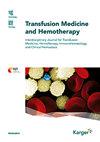两名献血者的分子遗传学和部分差异感染血清学疟疾检测
IF 1.9
4区 医学
Q3 HEMATOLOGY
引用次数: 0
摘要
& lt; b> & lt; i>简介:& lt; / i> & lt; / b>根据在德国有效的指南(GL),在疟疾流行地区出生或长大的人,或连续在疟疾流行地区停留超过6个月的人,只有在经过验证和质量保证的实验室诊断表明没有传染性证据的情况下,才能被允许献血。在联邦卫生部"血液"工作组的一份声明中,建议将推迟期从4年缩短至3年,并在推迟期之后进行抗体检测。& lt; b> & lt; i>方法:& lt; / i> & lt; / b>根据GL,我机构在保存期4年后进行PCR核酸检测(NAT)。除了有效的分子生物学检测外,还进行了感染血清学检查。& lt; b> & lt; i>案例表示:& lt; / i> & lt; / b>在目前的情况下,疟原虫</i>在延迟期结束后,在来自疟疾流行地区的两名献血者各自的单次PCR中检测到基因组。然而,一名供体的疟原虫抗体检测呈阴性。& lt; b> & lt; i>讨论/结论:& lt; / i> & lt; / b>这一观点是在工作组的一项建议的背景下讨论的。问题是是否PCR检测是可有可无的,或者是否应该支持感染血清学检测和NAT的组合。本文章由计算机程序翻译,如有差异,请以英文原文为准。
Moleculargenetic and in Addition Partly Discrepant Infection Serological Malaria Testing in Two Blood Donors
Introduction: According to the guidelines (GL) valid in Germany, persons born or raised in a malaria-endemic area or had continuously stayed in a malaria-endemic area for more than 6 months may only be admitted donating blood if, among other things, validated and quality-assured laboratory diagnostics show that there is no evidence of infectivity. In a statement of the Working Group "Blood" of the Federal Ministry of Health (WGB), a reduction of the deferral period from 4 to 3 years and an antibody test after the deferral period are recommended. Methods: In accordance with the GL, nucleic acid testing (NAT) by means of PCR is carried out at our institution after a retention period of 4 years. In addition to the validated molecular biological testing, an infection serological examination was performed. Case Presentation: In the present cases, Plasmodia genome was detected in the respective single PCR in two blood donors originating from malaria-endemic areas after the expiry of the deferral period. However, one donor tested negative for antibodies against Plasmodia. Discussion/Conclusion: This observation is discussed in the context of a recommendation of the WGB. The question is addressed whether PCR testing is dispensable or whether a combination of infection serological testing and NAT should be favored.
求助全文
通过发布文献求助,成功后即可免费获取论文全文。
去求助
来源期刊
CiteScore
4.00
自引率
9.10%
发文量
47
审稿时长
6-12 weeks
期刊介绍:
This journal is devoted to all areas of transfusion medicine. These include the quality and security of blood products, therapy with blood components and plasma derivatives, transfusion-related questions in transplantation, stem cell manipulation, therapeutic and diagnostic problems of homeostasis, immuno-hematological investigations, and legal aspects of the production of blood products as well as hemotherapy. Both comprehensive reviews and primary publications that detail the newest work in transfusion medicine and hemotherapy promote the international exchange of knowledge within these disciplines. Consistent with this goal, continuing clinical education is also specifically addressed.

 求助内容:
求助内容: 应助结果提醒方式:
应助结果提醒方式:


